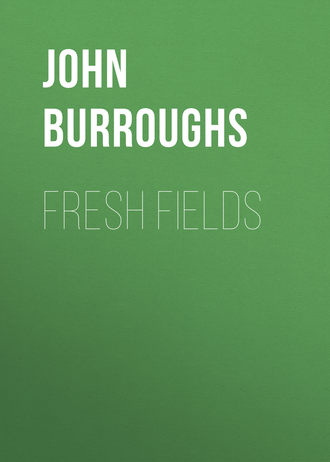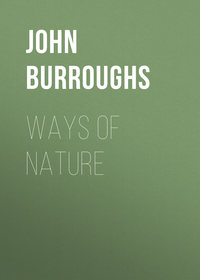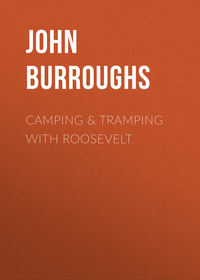 полная версия
полная версияFresh Fields
"The strawberry grows underneath the nettle;
And wholesome berries thrive and ripen best,
Neighbor'd by fruit of baser quality."
The British strawberry is found exclusively, I believe, in woods and copses, and the ripened fruit is smaller or lighter colored than our own.
Nature in this island is less versatile than with us, but more constant and uniform, less variety and contrast in her works, and less capriciousness and reservation also. She is chary of new species, but multiplies the old ones endlessly. I did not observe so many varieties of wild flowers as at home, but a great profusion of specimens; her lap is fuller, but the kinds are fewer. Where you find one of a kind, you will find ten thousand. Wordsworth saw "golden daffodils,"
"Continuous as the stars that shine
And twinkle on the milky way,"
and one sees nearly all the common wild flowers in the same profusion. The buttercup, the dandelion, the ox-eye daisy, and other field flowers that have come to us from Europe, are samples of how lavishly Nature bestows her floral gifts upon the Old World. In July the scarlet poppies are thickly sprinkled over nearly every wheat and oat field in the kingdom. The green waving grain seems to have been spattered with blood. Other flowers were alike universal. Not a plant but seems to have sown itself from one end of the island to the other. Never before did I see so much white clover. From the first to the last of July, the fields in Scotland and England were white with it. Every square inch of ground had its clover blossom. Such a harvest as there was for the honey-bee, unless the nectar was too much diluted with water in this rainy climate, which was probably the case. In traveling south from Scotland, the foxglove traveled as fast as I did, and I found it just as abundant in the southern counties as in the northern. This is the most beautiful and conspicuous of all the wild flowers I saw, – a spire of large purple bells rising above the ferns and copses and along the hedges everywhere. Among the copses of Surrey and Hants, I saw it five feet high, and amid the rocks of North Wales still higher. We have no conspicuous wild flower that compares with it. It is so showy and abundant that the traveler on the express train cannot miss it; while the pedestrian finds it lining his way like rows of torches. The bloom creeps up the stalk gradually as the season advances, taking from a month to six weeks to go from the bottom to the top, making at all times a most pleasing gradation of color, and showing the plant each day with new flowers and a fresh, new look. It never looks shabby and spent, from first to last. The lower buds open the first week in June, and slowly the purple wave creeps upward; bell after bell swings to the bee and moth, till the end of July, when you see the stalk waving in the wind with two or three flowers at the top, as perfect and vivid as those that opened first. I wonder the poets have not mentioned it oftener. Tennyson speaks of "the foxglove spire." I note this allusion in Keats: —
"Where the deer's swift leapStartles the wild bee from the fox-glove bell,"and this from Coleridge: —
"The fox-glove tallSheds its loose purple bells or in the gust,Or when it bends beneath the upspringing lark,Or mountain finch alighting."Coleridge perhaps knew that the lark did not perch upon the stalk of the foxglove, or upon any other stalk or branch, being entirely a ground bird and not a percher, but he would seem to imply that it did, in these lines.
A London correspondent calls my attention to these lines from Wordsworth, —
"Bees that soarHigh as the highest peak of Furness Fells,Yet murmur by the hour in foxglove bells;"and adds: "Less poetical, but as graphic, was a Devonshire woman's comparison of a dull preacher to a 'Drummle drane in a pop;' Anglicè, A drone in a foxglove, – called a pop from children amusing themselves with popping its bells."
The prettiest of all humble roadside flowers I saw was the little blue speedwell. I was seldom out of sight of it anywhere in my walks till near the end of June; while its little bands and assemblages of deep blue flowers in the grass by the roadside, turning a host of infantile faces up to the sun, often made me pause and admire. It is prettier than the violet, and larger and deeper colored than our houstonia. It is a small and delicate edition of our hepatica, done in indigo blue and wonted to the grass in the fields and by the waysides.
"The little speedwell's darling blue,"
sings Tennyson. I saw it blooming, with the daisy and the buttercup, upon the grave of Carlyle. The tender human and poetic element of this stern rocky nature was well expressed by it.
In the Lake district I saw meadows purple with a species of wild geranium, probably Geranium pratense. It answered well to our wild geranium, which in May sometimes covers wettish meadows in the same manner, except that this English species was of a dark blue purple. Prunella, I noticed, was of a much deeper purple there than at home. The purple orchids also were stronger colored, but less graceful and pleasing, than our own. One species which I noticed in June, with habits similar to our purple fringed-orchis, perhaps the pyramidal orchis, had quite a coarse, plebeian look. Probably the most striking blue and purple wild flowers we have are of European origin, as succory, blue-weed or bugloss, vervain, purple loosestrife, and harebell. These colors, except with the fall asters and gentians, seem rather unstable in our flora.
It has been observed by the Norwegian botanist Schübeler that plants and trees in the higher latitudes have larger leaves and larger flowers than farther south, and that many flowers which are white in the south become violet in the far north. This agrees with my own observation. The feebler light necessitates more leaf surface, and the fewer insects necessitate larger and more showy flowers to attract them and secure cross-fertilization. Blackberry blossoms, so white with us, are a decided pink in England. The same is true of the water-plantain. Our houstonia and hepatica would probably become a deep blue in that country. The marine climate probably has something to do also with this high color of the British flowers, as I have noticed that on our New England coast the same flowers are deeper tinted than they are in the interior.
A flower which greets all ramblers to moist fields and tranquil watercourses in midsummer is the meadow-sweet, called also queen of the meadows. It belongs to the Spiræa tribe, where our hardhack, nine-bark, meadow-sweet, queen of the prairie, and others belong, but surpasses all our species in being sweet-scented, – a suggestion of almonds and cinnamon. I saw much of it about Stratford, and in rowing on the Avon plucked its large clusters of fine, creamy white flowers from my boat. Arnold is felicitous in describing it as the "blond meadow-sweet."
They cultivate a species of clover in England that gives a striking effect to a field when in bloom, Trifolium incarnatum, the long heads as red as blood. It is grown mostly for green fodder. I saw not one spear of timothy grass in all my rambles. Though this is a grass of European origin, yet it seems to be quite unknown among English and Scotch farmers. The horse bean, or Winchester bean, sown broadcast, is a new feature, while its perfume, suggesting that of apple orchards, is the most agreeable to be met with.
I was delighted with the furze, or whin, as the Scotch call it, with its multitude of rich yellow, pea-like blossoms exhaling a perfume that reminded me of mingled cocoanut and peaches. It is a prickly, disagreeable shrub to the touch, like our ground juniper. It seems to mark everywhere the line of cultivation; where the furze begins the plow stops. It covers heaths and commons, and, with the heather, gives that dark hue to the Scotch and English uplands. The heather I did not see in all its glory. It was just coming into bloom when I left, the last of July; but the glimpses I had of it in North Wales, and again in northern Ireland, were most pleasing. It gave a purple border or fringe to the dark rocks (the rocks are never so lightly tinted in this island as ours are) that was very rich and striking. The heather vies with the grass in its extent and uniformity. Until midsummer it covers the moors and uplands as with a dark brown coat. When it blooms, this coat becomes a royal robe. The flower yields honey to the bee, and the plant shelter to the birds and game, and is used by the cottagers for thatching, and for twisting into ropes, and for various other purposes.
Several troublesome weeds I noticed in England that have not yet made their appearance in this country. Coltsfoot invests the plowed lands there, sending up its broad fuzzy leaves as soon as the grain is up, and covering large areas. It is found in this country, but, so far as I have observed, only in out-of-the-way places.
Sheep sorrel has come to us from over seas, and reddens many a poor worn-out field; but the larger species of sorrel, Rumex acetosa, so common in English fields, and shooting up a stem two feet high, was quite new to me. Nearly all the related species, the various docks, are naturalized upon our shores.
On the whole the place to see European weeds is in America. They run riot here. They are like boys out of school, leaping all bounds. They have the freedom of the whole broad land, and are allowed to take possession in a way that would astonish a British farmer. The Scotch thistle is much rarer in Scotland than in New York or Massachusetts. I saw only one mullein by the roadside, and that was in Wales, though it flourishes here and there throughout the island. The London correspondent, already quoted, says of the mullein: "One will come up in solitary glory, but, though it bears hundreds of flowers, many years will elapse before another is seen in the same neighborhood. We used to say, 'There is a mullein coming up in such a place,' much as if we had seen a comet; and its flannel-like leaves and the growth of its spike were duly watched and reported on day by day." I did not catch a glimpse of blue-weed, Bouncing Bet, elecampane, live-for-ever, bladder campion, and others, of which I see acres at home, though all these weeds do grow there. They hunt the weeds mercilessly; they have no room for them. You see men and boys, women and girls, in the meadows and pastures cutting them out. A species of wild mustard infests the best grain lands in June; when in bloom it gives to the oat-fields a fresh canary yellow. Then men and boys walk carefully through the drilled grain and pull the mustard out, and carry it away, leaving not one blossom visible.
On the whole, I should say that the British wild flowers were less beautiful than our own, but more abundant and noticeable, and more closely associated with the country life of the people; just as their birds are more familiar, abundant, and vociferous than our songsters, but not so sweet-voiced and plaintively melodious. An agreeable coarseness and robustness characterize most of their flowers, and they more than make up in abundance where they lack in grace.
The surprising delicacy of our first spring flowers, of the hepatica, the spring beauty, the arbutus, the bloodroot, the rue-anemone, the dicentra, – a beauty and delicacy that pertains to exclusive wood forms, – contrasts with the more hardy, hairy, hedge-row look of their firstlings of the spring, like the primrose, the hyacinth, the wood spurge, the green hellebore, the hedge garlic, the moschatel, the daffodil, the celandine, and others. Most of these flowers take one by their multitude; the primrose covers broad hedge banks for miles as with a carpet of bloom. In my excursions into field and forest I saw nothing of the intense brilliancy of our cardinal flower, which almost baffles the eye; nothing with the wild grace of our meadow or mountain lilies; no wood flower so taking to the eye as our painted trillium and lady's-slipper; no bog flower that compares with our calopogon and arethusa, so common in southeastern New England; no brookside flower that equals our jewel-weed; no rock flower before which one would pause with the same feeling of admiration as before our columbine; no violet as striking as our bird's-foot violet; no trailing flower that approaches our matchless arbutus; no fern as delicate as our maiden-hair; no flowering shrub as sweet as our azaleas. In fact, their flora presented a commoner type of beauty, very comely and pleasing, but not so exquisite and surprising as our own. The contrast is well shown in the flowering of the maples of the two countries, – that of the European species being stiff and coarse compared with the fringe-like grace and delicacy of our maple. In like manner the silken tresses of our white pine contrast strongly with the coarser foliage of the European pines. But what they have, they have in greatest profusion. Few of their flowers waste their sweetness on the desert air; they throng the fields, lanes, and highways, and are known and seen of all. They bloom on the housetops, and wave from the summits of castle walls. The spring meadows are carpeted with flowers, and the midsummer grain-fields, from one end of the kingdom to the other, are spotted with fire and gold in the scarlet poppies and corn marigolds.
I plucked but one white pond-lily, and that was in the Kew Gardens, where I suppose the plucking was trespassing. Its petals were slightly blunter than ours, and it had no perfume. Indeed, in the matter of sweet-scented flowers, our flora shows by far the more varieties, the British flora seeming richer in this respect by reason of the abundance of specimens of any given kind.
It is, indeed, a flowery land; a kind of perpetual spring-time reigns there, a perennial freshness and bloom such as our fierce skies do not permit.
IX
BRITISH FERTILITY
I
In crossing the Atlantic from the New World to the Old, one of the first intimations the traveler has that he is nearing a strange shore, and an old and populous one, is the greater boldness and familiarity of the swarms of sea-gulls that begin to hover in the wake of the ship, and dive and contend with each other for the fragments and parings thrown overboard from the pantry. They have at once a different air and manner from those we left behind. How bold and tireless they are, pursuing the vessel from dawn to dark, and coming almost near enough to take the food out of your hand as you lean over the bulwarks. It is a sign in the air; it tells the whole story of the hungry and populous countries you are approaching; it is swarming and omnivorous Europe come out to meet you. You are near the sea-marge of a land teeming with life, a land where the prevailing forms are indeed few, but these on the most copious and vehement scale; where the birds and animals are not only more numerous than at home, but more dominating and aggressive, more closely associated with man, contending with him for the fruits of the soil, learned in his ways, full of resources, prolific, tenacious of life, not easily checked or driven out, – in fact, characterized by greater persistence and fecundity. This fact is sure, sooner or later, to strike the American in Britain. There seems to be an aboriginal push and heat in animate nature there, to behold which is a new experience. It is the Old World, and yet it really seems the New in the virility and hardihood of its species.
The New Englander who sees with evil forebodings the rapid falling off of the birth-rate in his own land, the family rills shrinking in these later generations, like his native streams in summer, and who consequently fears for the perpetuity of the race, may see something to comfort him in the British islands. Behold the fecundity of the parent stock! The drought that has fallen upon the older parts of the New World does not seem to have affected the sources of being in these islands. They are apparently as copious and exhaustless as they were three centuries ago. Britain might well appropriate to herself the last half of Emerson's quatrain: —
"No numbers have counted my tallies,No tribes my house can fill;I sit by the shining Fount of Life,And pour the deluge still."For it is literally a deluge; the land is inundated with humanity. Thirty millions of people within the area of one of our larger States, and who shall say that high-water mark is yet reached? Everything betokens a race still in its youth, still on the road to empire. The full-bloodedness, the large feet and hands, the prominent canine teeth, the stomachic and muscular robustness, the health of the women, the savage jealousy of personal rights, the swarms upon swarms of children and young people, the delight in the open air and in athletic sports, the love of danger and adventure, a certain morning freshness and youthfulness in their look, as if their food and sleep nourished them well, together with a certain animality and stupidity, – all indicate a people who have not yet slackened speed or taken in sail. Neither the land nor the race shows any exhaustion. In both there is yet the freshness and fruitfulness of a new country. You would think the people had just come into possession of a virgin soil. There is a pioneer hardiness and fertility about them. Families increase as in our early frontier settlements. Let me quote a paragraph from Taine's "Notes: " —
"An Englishman nearly always has many children, – the rich as well as the poor. The Queen has nine, and sets the example. Let us run over the families we are acquainted with: Lord – has six children; the Marquis of – , twelve; Sir N – , nine; Mr. S – , a judge, twenty-four, of whom twenty-two are living; several clergymen, five, six, and up to ten and twelve."
Thus is the census kept up and increased. The land, the towns and cities, are like hives in swarming time; a fertile queen indeed, and plenty of brood-comb! Were it not for the wildernesses of America, of Africa, and Australia, to which these swarms migrate, the people would suffocate and trample each other out. A Scotch or English city, compared with one of ours, is a kind of duplex or compound city; it has a double interior, – the interior of the closes and alleys, in which and out of which the people swarm like flies. Every country village has its closes, its streets between streets, where the humbler portion of the population is packed away. This back-door humanity streams forth to all parts of the world, and carries the national virtues with it. In walking through some of the older portions of Edinburgh, I was somehow reminded of colonies of cliff swallows I had seen at home, packed beneath the eaves of a farmer's barn, every inch of space occupied, the tenements crowding and lapping over each other, the interstices filled, every coign of vantage seized upon, the pendent beds and procreant cradles ranked one above another, and showing all manner of quaint and ingenious forms and adaptability to circumstances. In both London and Edinburgh there are streets above streets, or huge viaducts that carry one torrent of humanity above another torrent. They utilize the hills and depressions to make more surface room for their swarming myriads.
One day, in my walk through the Trosachs in the Highlands, I came upon a couple of ant-hills that arrested my attention. They were a type of the country. They were not large, scarcely larger than a peck measure, but never before had I seen ant-hills so populous and so lively. They were living masses of ants, while the ground for yards about literally rustled with their numbers. I knew ant-hills at home, and had noted them carefully, hills that would fill a cart-box; but they were like empty tenements compared with these, a fort garrisoned with a company instead of an army corps. These hills stood in thin woods by the roadside. From each of them radiated five main highways, like the spokes of a wheel. These highways were clearly defined to the eye, the grass and leaves being slightly beaten down. Along each one of them there was a double line of ants, – one line going out for supplies and the other returning with booty, – worms, flies, insects, a constant stream of game going into the capitol. If the ants, with any given worm or bug, got stuck, those passing out would turn and lend a helping hand. The ground between the main highways was being threaded in all directions by individual ants, beating up and down for game. The same was true of the surface all about the terminus of the roads, several yards distant. If I stood a few moments in one place, the ants would begin to climb up my shoes and so up my legs. Stamping them off seemed only to alarm and enrage the whole camp, so that I would presently be compelled to retreat. Seeing a big straddling beetle, I caught him and dropped him upon the nest. The ants attacked him as wolves might attack an elephant. They clung to his legs, they mounted his back, and assaulted him in front. As he rushed through and over their ranks, down the side of the mound, those clinging to his legs were caught hold of by others, till lines of four or five ants were being jerked along by each of his six legs. The infuriated beetle cleared the mound, and crawled under leaves and sticks to sweep off his clinging enemies, and finally seemed to escape them by burying himself in the earth. Then I took one of those large, black, shelless snails with which this land abounds, a snail the size of my thumb, and dropped it upon the nest. The ants swarmed upon it at once, and began to sink their jaws into it. This woke the snail up to the true situation, and it showed itself not without resources against its enemies. Flee, like the beetle, it could not, but it bore an invisible armor; it began to excrete from every pore of its body a thick, whitish, viscid substance, that tied every ant that came in contact with it, hand and foot, in a twinkling. When a thick coating of this impromptu bird-lime had been exuded, the snail wriggled right and left a few times, partly sloughing it off, and thus ingulfing hundreds of its antagonists. Never was army of ants or of men bound in such a Stygian quagmire before. New phalanxes rushed up and tried to scale the mass; most of them were mired like their fellows, but a few succeeded and gained the snail's back; then began the preparation of another avalanche of glue; the creature seemed to dwindle in size, and to nerve itself to the work; as fast as the ants reached him in any number he ingulfed them; he poured the vials of his glutinous wrath upon them till he had formed quite a rampart of cemented and helpless ants about him; fresh ones constantly coming up laid hold of the barricade with their jaws, and were often hung that way. I lingered half an hour or more to see the issue, but was finally compelled to come away before the closing scene. I presume the ants finally triumphed. The snail had nearly exhausted its ammunition; each new broadside took more and more time and was less and less effective; while the ants had unlimited resources, and could make bridges of their sunken armies. But how they finally freed themselves and their mound of that viscid, sloughing monster I should be glad to know.
But it was not these incidents that impressed me so much as the numbers and the animation of the ants, and their raiding, buccaneering propensities. When I came to London, I could not help thinking of the ant-hill I had seen in the North. This, I said, is the biggest ant-hill yet. See the great steam highways, leading to all points of the compass; see the myriads swarming, jostling each other in the streets, and overflowing all the surrounding country. See the underground tunnels and galleries and the overground viaducts; see the activity and the supplies, the whole earth the hunting-ground of these insects and rustling with their multitudinous stir. One may be pardoned, in the presence of such an enormous aggregate of humanity as London shows, for thinking of insects. Men and women seem cheapened and belittled, as if the spawn of blow-flies had turned to human beings. How the throng stream on interminably, the streets like river-beds, full to their banks! One hardly notes the units, – he sees only the black tide. He loses himself, and becomes an insignificant ant with the rest. He is borne along through the galleries and passages to the underground railway, and is swept forward like a drop in the sea. I used to make frequent trips to the country, or seek out some empty nook in St. Paul's, to come to my senses. But it requires no ordinary effort to find one's self in St. Paul's, and in the country you must walk fast or London will overtake you. When I would think I had a stretch of road all to myself, a troop of London bicyclists would steal up behind me and suddenly file by like spectres. The whole land is London-struck. You feel the suction of the huge city wherever you are. It draws like a cyclone; every current tends that way. It would seem as if cities and towns were constantly breaking from their moorings and drifting thitherward and joining themselves to it. On every side one finds smaller cities welded fast. It spreads like a malignant growth, that involves first one organ and then another. But it is not malignant. On the contrary, it is perhaps as normal and legitimate a city as there is on the globe. It is the proper outcome and expression of that fertile and bountiful land, and that hardy, multiplying race. It seems less the result of trade and commerce, and more the result of the domestic home-seeking and home-building instinct, than any other city I have yet seen. I felt, and yet feel, its attraction. It is such an aggregate of actual human dwellings that this feeling pervades the very air. All its vast and multiplex industries, and its traffic, seem domestic, like the chores about the household. I used to get glimpses of it from the northwest borders, from Hampstead Heath, and from about Highgate, lying there in the broad, gentle valley of the Thames, like an enormous country village – a village with nearly four million souls, where people find life sweet and wholesome, and keep a rustic freshness of look and sobriety of manner. See their vast parks and pleasure grounds; see the upper Thames, of a bright Sunday, alive with rowing parties; see them picnicking in all the country adjacent. Indeed, in summer a social and even festive air broods over the whole vast encampment. There is squalor and misery enough, of course, and too much, but this takes itself away to holes and corners.









